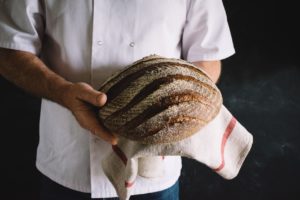Planning
Article
We’re looking at ways to completely restructure the business

The coronavirus lockdown has been eye-opening for Catherine Connor, co-founder of bread specialists Lovingly Artisan. Now, she’s eyeing a restructure and a very different future ahead.
In the not-too-distant past, life at Lovingly Artisan was hectic, to say the least. When co-founders Catherine Connor and her husband Aidan Monks went on their first holiday in what seemed like a lifetime last year, it caused “nothing but drama” according to Catherine. Working 90–hour weeks were not uncommon.
While business was good – the enterprise had grown in ten years from a micro-bakery at Oxenholme Railway Station in the North West of England, into a team of 23 spread across two bakeries, a small shop and a market stall – the work–life balance needed a rethink. The lockdown provided the time to do that.
A rapid pivot
“Our business has historically mostly catered to the wholesale market,” explained Catherine. “Everything from intimate café/bars to Michelin–starred restaurants and, when coronavirus hit, that all disappeared within days.”
Just two months earlier, the husband and wife team had opened a small shop at their main bakery in Kendal. The need to be proactive with this shop was suddenly staring them in the face.
Catherine’s definition of proactive spans everything from boosting their presence on social media – including a new bread-making workshop online – to making sure that visitors to the new shop, and another one at Altrincham Market, were given the kind of cheerful, personal experience you might read about in a 1920s children’s novel.
“People were coming to the counter and saying, ‘This is amazing’,” she added. “They got to know our names, were telling us what they’ve been up to, and have been enjoying the social aspect of it all. For many customers, we’re the only people they’ve seen all week.”
Like-minded foodies
Alongside this, Lovingly Artisan has embarked upon a series of collaborations with other food businesses in the North West of England that have seen trade take a similar hit as a result of the pandemic. It’s a kind of amiable you scratch my back and I’ll scratch yours arrangement, powered – said Catherine – by “good old-fashioned northern goodwill”.
“It was simply a case of, ‘How can we help each other and support each other as we go on this journey together?’” she added. Catherine can’t identify a specific ringleader – it was more of a natural coming-together of like-minded foodies who recognised that they were in the midst of something new.
So far, Lovingly Artisan have teamed up with an organic fruit and veg producer in Cheshire and are currently supplying more than 1,000 loaves per week. It has also partnered with award-winning Mrs Kirkham’s Lancashire Cheese to help boost the local cheese industry – even going so far as to include Mrs Kirkham’s in two of its signature loaves and renaming them to reflect this. In return, the cheesemaker is selling Lovingly Artisan products in its new farm shop.
Catherine and Aidan have worked with a local butcher to create a special Father’s Day brunch and joined forces with an artisan butter maker whose produce is now sold in stores – it’s an all-hands-on-deck approach which, despite the many negatives, including in Catherine’s case the furloughing of most her staff, will undoubtedly turn out to be the source of some positive memories, too.
Eyes have been opened
“One thing this has done is introduce us to some new audiences,” she commented, “and it has really opened people’s eyes to what we do – we’re finding people coming to see us who say they can’t ever imagine going back to the supermarket.”
For Catherine too, there’s no going back. She’s enjoying the new role she is playing in people’s lives – and she’s definitely not missing the long hours that she once endured. “We’ve realised that we just didn’t have the balance right until our lives were stopped,” she added. “It was a frightening few weeks, but we’ve decided that, going forwards, on the wholesale side we’re only going to deal with a small handful of customers. We’re looking at ways in which we can completely restructure the business.”
The business owner thinks that a lot of her team have been re-evaluating their lives, too. She wonders if the whole world is ready for change. “If we look at the good things that have happened, such as people taking time to sit down and eat with their families, and if we can help them to hang on to that, then hallelujah.”
Catherine’s top tips
- Create a future-proof business
I think people really need to think about the next two years. If there’s a second spike, you have to create a business today that could deal with that. - Get the balance right
I think the pandemic has given people the chance to really think about this – and that’s important. It’s not about taking it easy, it’s about being creative with your time and resources. During the lockdown we completely redid our entire bread menu, making every single loaf the best it could be. We’d never have had the chance to do that before. - Be more efficient
We now want everything we make to be as profitable as it can be, and that means some of our breads have disappeared because they just weren’t profitable enough. Everything that travels through the business has to have golden margins.